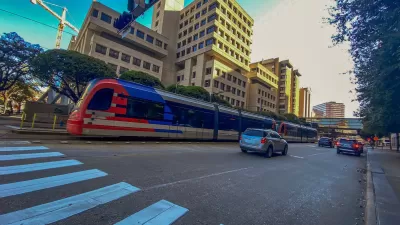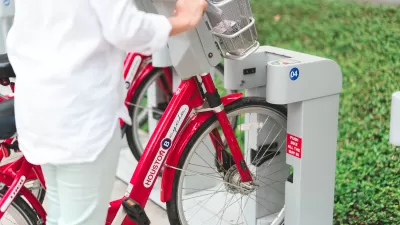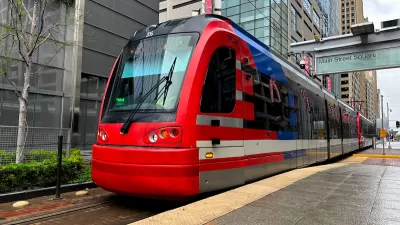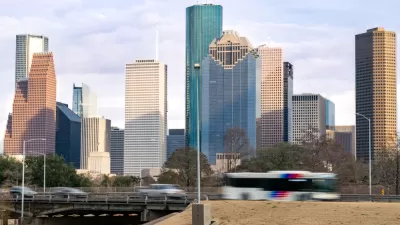A new plan from the city’s transit agency focuses on improving the rider experience and boosting safety, but remains uncommitted to previous plans to build new BRT lines.

Houston’s Metropolitan Transit Authority of Harris County (METRO) unveiled a new plan
focused on reliability, cleanliness, safety, and accessibility that aims to increase ridership and improve the transit experience for users.
The agency’s plan, dubbed METRONow, is a revised version of the city’s prior METRONext plan, explains Dominic Walsh in Houston Public Media. It calls for 350 new buses and the replacement of 100 accessible vehicles, as well as accessibility improvements at bus stops. It includes a $7 million investment in security initiatives such as lighting, fences, and patrols on trains.
The agency previously scrapped bus rapid transit projects, citing cost concerns. Now, some of those projects might move forward under the new plan. However, the agency killed the proposed University Corridor BRT line, which would have linked multiple universities over a 25-mile line. It also demoted a planned BRT line along Interstate 10 to a shared high occupancy vehicle lane.
FULL STORY: Houston transit authority unveils ‘METRONow’ initiative focused on cleanliness, safety and ridership

Manufactured Crisis: Losing the Nation’s Largest Source of Unsubsidized Affordable Housing
Manufactured housing communities have long been an affordable housing option for millions of people living in the U.S., but that affordability is disappearing rapidly. How did we get here?

Americans May Be Stuck — But Why?
Americans are moving a lot less than they once did, and that is a problem. While Yoni Applebaum, in his highly-publicized article Stuck, gets the reasons badly wrong, it's still important to ask: why are we moving so much less than before?

Research Shows More Roads = More Driving
A national study shows, once again, that increasing road supply induces additional vehicle travel, particularly over the long run.

Judge Halts Enforcement of Anti-Homeless Laws in Grants Pass
The Oregon city will be barred from enforcing two ordinances that prosecute unhoused residents until it increases capacity and accessibility at designated camping sites.

Advancing Sustainability in Los Angeles County Schools
The Los Angeles County Office of Education’s Green Schools Symposium brings together educators, students, and experts to advance sustainability in schools through innovative design, climate resilience strategies, and collaborative learning.

Using Old Oil and Gas Wells for Green Energy Storage
Penn State researchers have found that repurposing abandoned oil and gas wells for geothermal-assisted compressed-air energy storage can boost efficiency, reduce environmental risks, and support clean energy and job transitions.
Urban Design for Planners 1: Software Tools
This six-course series explores essential urban design concepts using open source software and equips planners with the tools they need to participate fully in the urban design process.
Planning for Universal Design
Learn the tools for implementing Universal Design in planning regulations.
City of Moreno Valley
Institute for Housing and Urban Development Studies (IHS)
City of Grandview
Harvard GSD Executive Education
NYU Wagner Graduate School of Public Service
City of Cambridge, Maryland
Newport County Development Council: Connect Greater Newport





























